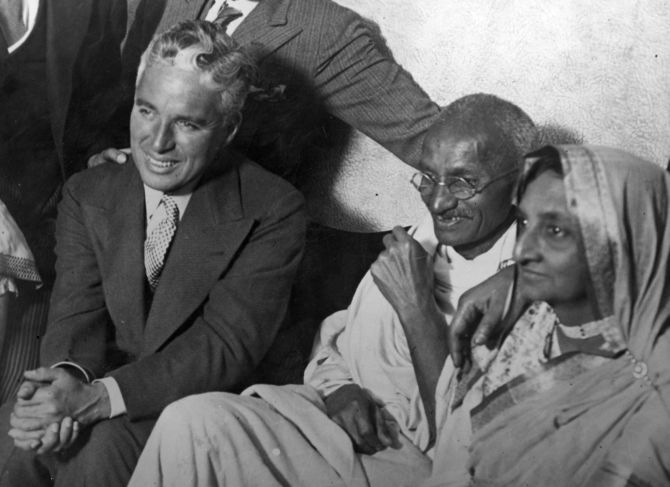'Gandhi has not become out of date, we have.'

Chandrashekhar Dharmadhikari is a former chief justice of the Bombay high court. He worked with Mahatma Gandhi at a young age and has been a staunch 'Gandhi vicharak' for decades.
Justice Dharmadhikari was in Patna to attend the centenary celebrations of the Champaran Satyagraha, Mahatma Gandhi's first non-violent struggle against the British in 1917.
The soft-spoken judge, 90, spoke to M I Khan about why Gandhian ideas are still relevant in Modi's India.
Has Gandhism lost its relevance?
Gandhi used to say that there is nothing like 'Gandhism or Gandhivaad.' He was a man who experimented with truth. Words like 'Gandhian,' 'Gandhism' or 'Gandhivaad' were not in his dictionary.
Adding 'ism' or 'vaad' to any ideology brings stagnation in it.
The best thing for one to say is that one is a 'Gandhi vicharak,' someone who does brainstorming on Gandhi's thoughts. Others may be described as committed to take Gandhi's work forward.
Gandhi was not ready to accept 'vaad' or 'ism' after his name. He was against it.
Gandhi has only ceased to exist physically after assassinated. His thoughts and ideas flow as usual.
There is a need to study, analyse and understand Gandhi's thoughts. But they have not become a part of our lives till date.
What about hundreds of self-proclaimed Gandhians or Gandhivaadis?
Gandhi had more disciples and fewer successors.
A successor takes the work and thoughts of a person forward while a disciple merely follows what a person said.
For many, following Gandhi's thoughts is like performing rituals. They don't understand him.
We need to discuss his thoughts and take them forward.
Decades after the assassination, why did Nathuram Godse kill him?
Gandhi's killing was a conspiracy. Godse represents a belief.
He believed that if you take away the head of a man, his thoughts will also be finished.
But he forgot that he assassinated a man who had said that 'My life is my message.'
Gandhi experimented with truth his entire life; some of his experiments failed too.
In the end, only those fail who experiment. A person who never appeared for an examination never failed.
The attitude of experimenting with truth must be understood and followed. I think till date we have not understood Gandhi fully.
How can we spread his thoughts among the younger generation?
Gandhi's focus was on two things: Sangarsh (struggle) and rachna (creation).
He didn't only talk about a non-violent struggle against injustice, but also about a constructive result.
His fight was to change society.
Conversely, thinking only about a constructive result without struggling for it is also meaningless.
Gandhi also stresses on duties more than rights.
The younger generation can be made aware of such things. Gandhi has taught us to create an interest for his thoughts among them.
What was your experience with Gandhi? How did it change your life?
I still feel a sensation when I think about how he once put his hand on my shoulder to walk.
That touch strengthened my shoulders enough to never shy away from performing my duties or compromise on my principles.
Even during the Emergency, as a judge of the Bombay high court, I performed my duties well.
I never bowed down before anyone after his touch on my shoulder, I am proud of it.
Some say Gandhi is not relevant now as his thoughts have become outdated.
Gandhi has not become out of date, we have.
Gandhi used a telephone then, he travelled across the country in trains.
If he were alive today, he would have had social media accounts, and a personal laptop.
He was very scientific. He was not against machines.
A man was killed in Alwar by so-called 'cow protectors.' Similar incidents involving 'gau rakshaks' have been reported across the country. How could Gandhi have reacted to it?
Gandhi never used the phrase 'gau raksha' (cow protection). He instead called for 'gau seva' (serving the cow).
Gandhi would have never approved of such a move (to kill people in order to protect cows).
But a mob is like a head without a brain.
Some people question the title 'Father of the Nation' for Gandhi. How do you see this?
Before Gandhi arrived, India was a country, but not a nation.
The word 'rashtrapita' or 'father of the nation' is important.
Netaji Subhas Chandra Bose never called him Bharatpita or Indiapita. He called him rashtrapita. A country is different from a nation.
Before Gandhi, only Adi Shankarachrya had visited the entire country. But he did that with a religious aspect.
Gandhi visited the country, from Kanyakumari to Kashmir, to understand the socio-political situation and culture of people.
What is your view on the Kashmir issue?
We seem to only want the land of Kashmir, not its people. We want them to go to Pakistan.
We don't love the people of Kashmir. We only love the land. Only landlords love the land.
We must develop people to people dialogue. It is the only way to solve the problem.
The government to government initiative has failed. Now, only a people to people dialogue will work.
What is your worst fear?
Sometimes I fear India will disintegrate.
Kashmir and the North East states have been showing a clear sign of it. I also fear South and North India will be separated.
What is the lifeline of a vibrant democracy?
The freedom to dissent is a must in a democracy, so is the Opposition.
IMAGE: Mahatma Gandhi with Charlie Chaplin, left, London, 1931. Photograph: Getty Images
MUST READ features in the RELATED LINKS BELOW...






 © 2025
© 2025